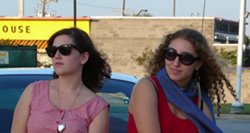 Liana: 23, went to UC Santa Cruz, was working full-time at a health clinic, and is now teaching and studying for her education degree, half Cuban, half Mexican, recently engaged, feminist.
Liana: 23, went to UC Santa Cruz, was working full-time at a health clinic, and is now teaching and studying for her education degree, half Cuban, half Mexican, recently engaged, feminist.On changing her name after marriage:
"I feel a responsibility to young women through teaching. I want to give the Mexican children in the community a strong female example. That’s why I hesitate to change my name when I get married. I never thought I would want to change my name growing up until I met Bobby [her fiance]. I take pride in his name and his family. But I have these inner pangs to keep [her last name] Gomez and let my students know I’m half Mexican.”
Discussion Question:
Question 1






















